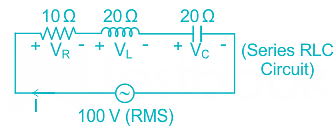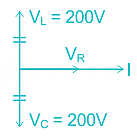Practice Test: Electronics Engineering (ECE)- 1 - Electronics and Communication Engineering (ECE) MCQ
30 Questions MCQ Test - Practice Test: Electronics Engineering (ECE)- 1
General solution of the differential equation x2dy + y(x + y) dx = 0 is
If the system of equations αx + 3y + 5z = 0, 2x - 4αy + αz = 0, -4x + 18y + 7z = 0 has infinite number of solutions, then the value of α is
| 1 Crore+ students have signed up on EduRev. Have you? Download the App |
In false position method the value of x(1) is obtained by the formula
If y = f(x) is the solution of the initial value problem
A series RLC circuit consisting of R = 10 Ω, XL = 20 Ω and XC = 20 Ω, is connected across an AC supply of 100 V (rms). The magnitude and pulse angle (with respect to supply voltage) of the voltage across the induction coil are respectively.
Two 2H inductance coils are connected in series and are magnetically coupled to each other, the coefficient of coupling being 0.1. The total inductance of the combination can be ______________ .H
The number of independent loops for a network with ‘n’ nodes and 'b' branches is
An infrared LED is usually fabricated from
A small concentration of minority carriers is injected into a homogenous semiconductor crystal at one point. An electric field of 10 V.cm-1 is applied across the crystal and this moves the minority carriers a distance of 1cm in 20μsec. The mobility (in cm2/Volt.sec) will be _____________ .
The diffusion potential across a P-N junction
The minimum number of NAND gates required to implement the Boolean function  is equal to
is equal to
A 12bit ADC is operating with a 1μsec clock period and the total conversion time is seen to be 12μsec. The ADC must be of the
is used as the chip select logic of a 4 K RAM in an 8085 system, then its memory ranne will he
The current gain of a bipolar transistor drops at high frequencies because of
Assume that the op-amp in the figure is ideal. If V, is a triangular wave, then V0 will be
In a transistor push pull amplifier
For a random variable x following the probability density function p(x) shown in figure, the mean and the variance are respectively.
A super heterodyne radio receiver with an intermediate frequency of 455 KHz. is tuned to a station operating at 1200 KHz. The associated image frequency is _____________ KHz
A rectangular pulse of duration T is applied to a filter matched to this input. The output of the filter is a
Which of the following signals is / are periodic?
1. S(t) = Cos 2t + Cos 3t + Cos 5t
2. S(t) = exp (j8π t)
3. S(t) = exp (-7t) Sin 10πt
4. S(t) = Cos 2t Cos 4t
The fourier series of an odd periodic function, contains only
For a second order system, damping ratio, (ξ,) is 0 < ξ < 1, then the roots of the characteristic polynomial are
The unit impulse response of a linear time invariant system is the unit step function u(t). For t > 0, the response of the system to an excitation e-at u(t), a > 0 will be
The phase velocity of waves propagating in a hoilow metal wave guide is
A bag contains five balls and it is not known how many of them are white. It is observed that two balls drawn from the bag at random are white. Find the probability that ail the balls in the bag are white.
the closed region consisting of the cylinder x2 + y2 = 9 and the circular disk z = 0 and z = 2.
For the JFET amplifier shown in figure, the JFET is having μ = 50 and rd = 10 KΩ.The external resistors are Rd =10KΩ, Rs= 2 KΩ. The a.c small signal mid band voltage gain is



















